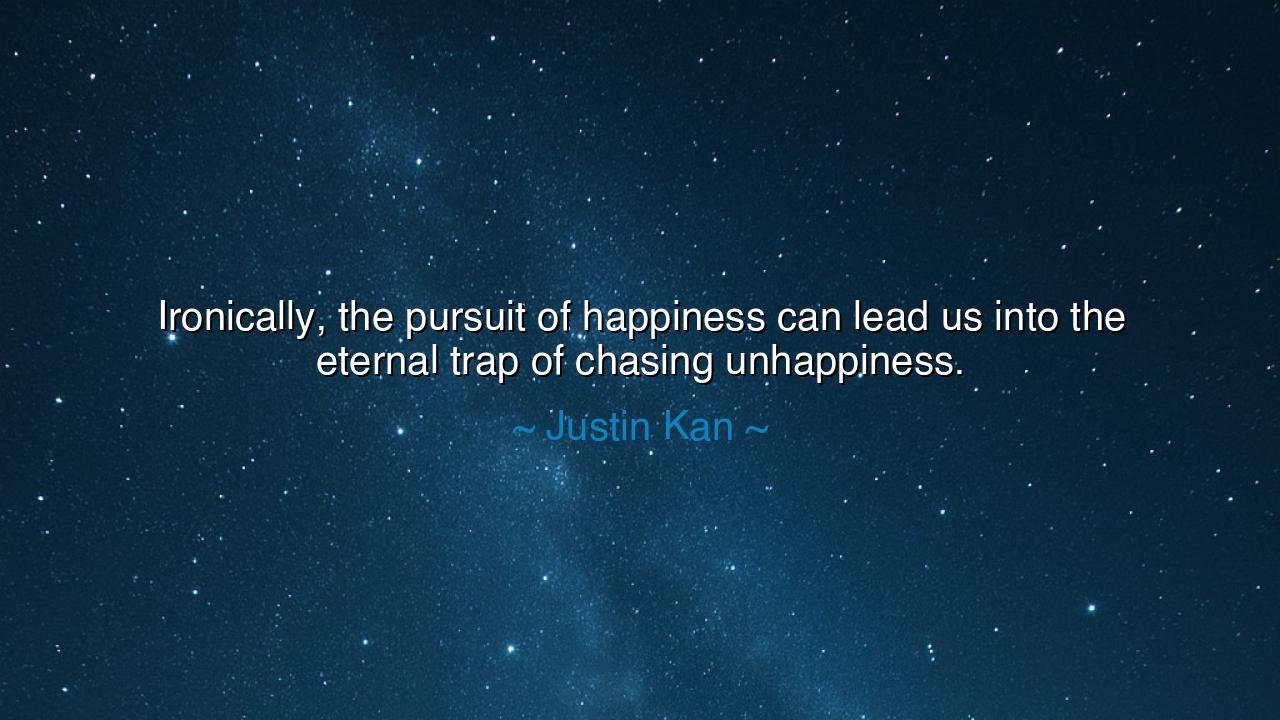
Ironically, the pursuit of happiness can lead us into the eternal
Ironically, the pursuit of happiness can lead us into the eternal trap of chasing unhappiness.






“Ironically, the pursuit of happiness can lead us into the eternal trap of chasing unhappiness.” Thus spoke Justin Kan, a creator of the modern world, yet a philosopher at heart — a man who reached great heights of success, only to discover that joy cannot be hunted like prey. In these words, he reveals one of life’s deepest paradoxes: that the more one pursues happiness as a possession, the further it drifts away. For happiness is not a treasure to be seized, but a light that appears only when the heart ceases to grasp. When one lives in constant striving — measuring joy in accomplishments, possessions, or praise — one awakens not contentment, but an unquenchable thirst. And thus begins the eternal trap: the cycle of desire, disappointment, and despair.
The origin of this reflection lies in the modern age, yet its wisdom is as ancient as philosophy itself. Justin Kan, the founder of the streaming platform Twitch, achieved what many dream of — wealth, recognition, and worldly success. Yet in the midst of his triumph, he found himself haunted by emptiness. He had reached the summit of ambition, but not the peace he expected to find there. In time, he realized the cruel irony: that the harder he pursued happiness, the more it eluded him. For his happiness had become conditional — tied to outcomes, to approval, to the shifting tides of fortune. And in this realization, he uncovered an ancient truth: that happiness pursued as an end becomes its own undoing.
The ancients, too, warned of this illusion. The philosopher Epicurus taught that joy is found not in excess, but in moderation — not in acquisition, but in the stillness of the soul. Those who chase pleasure, he said, are like those who drink saltwater: the more they consume, the greater their thirst. Justin Kan’s words echo this same warning for our age, where endless striving has become a creed. We live in pursuit — of success, of validation, of perfection — and in doing so, we mistake movement for meaning. The trap is subtle but inescapable: when happiness is made a goal, every moment without it feels like failure. Thus, we condemn ourselves to chasing unhappiness, mistaking the horizon of joy for something we can reach by running faster.
Consider the story of Emperor Augustus, ruler of the greatest empire on earth. He conquered nations, built monuments, and achieved a glory few have ever known. Yet in his final days, he is said to have asked, “Have I played my part well?” — as though all his triumphs could not silence the ache of doubt within. His endless pursuit of greatness brought not peace, but restlessness. He had all that men desire, yet he, too, stood before the mirror of unhappiness, realizing that happiness cannot be forced by power or possession. His question, like Kan’s, reveals that fulfillment is not found in the conquest of life, but in the acceptance of it.
This pursuit of happiness, when misunderstood, becomes tyranny over the soul. The man who chases joy as a trophy cannot rest, for joy cannot be captured — it can only be experienced. Each time he attains one desire, another arises, and he is trapped once more. The eternal trap is not built by fate, but by expectation. To demand that life make us happy is to wage war with the present moment. Only when one stops chasing, and begins simply to live, does happiness return — quietly, naturally, like a bird alighting on an open hand.
Yet there is hope in this paradox. For once a person understands that the pursuit of happiness is not about attainment, but about alignment — alignment with truth, gratitude, and purpose — the trap is broken. Justin Kan, having turned away from endless striving, found peace not in success, but in mindfulness, in service, in acceptance. This is the wisdom of all ages: happiness is not something we chase, but something we become when we stop resisting the flow of life. The more we let go of our need to be happy, the freer we become to experience happiness itself.
Therefore, my children, heed this lesson well. Do not waste your years chasing joy like a shadow; stand still, and let it find you. Live with intention, but without obsession. Work, love, and create — not because they will make you happy, but because they are worthy in themselves. Seek contentment in what you have, and acceptance in what you cannot change. The greatest peace lies not in the fulfillment of every desire, but in the quiet realization that nothing more is needed.
And remember always the words of Justin Kan: “The pursuit of happiness can lead us into the eternal trap of chasing unhappiness.” Let them remind you that joy cannot be bought, built, or conquered — it must be lived. For happiness is not a destination at the end of the road, but the light that shines upon the path itself, guiding those who walk with gratitude, humility, and peace.






AAdministratorAdministrator
Welcome, honored guests. Please leave a comment, we will respond soon